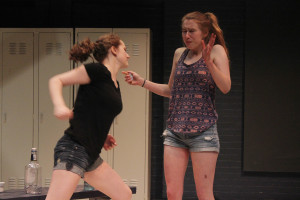For its Spring Experimental Production, the Yale Dramatic Association is staging a piece that traces the lives of two friends who grapple with the realities of growing up.
“Dry Land” by Ruby Spiegel ’15 opens this Thursday night at the Iseman Theater. Set in the present day, the play follows the friendship of two female high school swimmers named Amy and Ester, who struggle with the challenges of adulthood, sexuality and body image. Spiegel said that she wanted to highlight the complexities of female friendship and girls’ relationships to their bodies without writing an unoriginal commentary on the portrayal of the female body in popular culture.
“I was particularly interested in writing something about young women and their bodies in the world of athletics because I didn’t want to write another play about girls and the media,” Spiegel said.
Cast and creative team members interviewed said that the process of staging an original student-written work creates unique challenges but also offers many advantages. Kathleen Addison ’14, the show’s producer, said that because the play has never been staged before, no one can look to any previous production for inspiration. But Addison noted that the lack of precedent allows the current production team to be creative in their vision for the play. Lucy Fleming ’16, who plays Ester, said that being able to personally consult the playwright for clarifications and guidance on the script is a rare opportunity for actors.
The Dramat’s production of “Dry Land” directly follows its staging of “A Midsummer Night’s Dream” in February. While Shakespeare’s most well-known comedy required 15 cast members, several dozen crew members and highly elaborate technical designs, Spiegel’s play only features four characters and is set mostly in a girl’s locker room. Fleming, who played Helena in “A Midsummer Night’s Dream,” said that it is rare for the Dramat to stage shows with such small ensembles. Henry Gottfried ’14, the play’s director, said he thinks the play’s contemporary setting adds an element of diversity to the Dramat’s current season, noting that all of the other shows were written decades or centuries ago.
Gottfied emphasized the play’s “intimate” stage design, explaining that the play’s set is not large and that the audience will be seated extremely close to the stage, which has been tucked into one corner of the theater. Gottfried said he thinks that the small cast size and compact performance space will put more pressure on the actors to drive the play solely through their interactions, but also hopefully allow audience members to gain a greater understanding of these characters.

[media-credit name=”Sara Miller ” align=”alignleft” width=”300″] Ruby Spiegel’s play “Dry Land” attempts to approach the issues of adolescent girls’ sexuality and body image without playing to the usual tropes used to talk about them.
“[The play] is very truthful in the way it depicts young people,” Gottfried said. “It doesn’t try to neaten up or beautify what is sometimes a very ugly or inappropriate thing to say out loud.”
Gottfried added that he thinks the characters’ interactions in the play accurately reflect the types of topics that young adults talk about on an everyday basis: these characters could switch from discussing an essay they have to write for class in one scene to talking about a recent sexual experience they have had in the next. Fleming said that the characters’ lines in the script include words that are frequently used in casual conversations, including ‘like’ and ‘um,’ which make the characters more believable.
Addison said she believes that the play’s modern setting will cause audience members to relate more easily to the people as well as the events they will see on stage, noting that the characters in the play are very close in age to college students. Fleming said the play’s two main characters are based on the well-known image of “the sexually loose, really pretty, popular, confident girl” and “the quiet, withdrawn, socially outcast girl.” Jacob Osborne ’16, who plays a college student named Victor, said he thinks that nearly all audience members can identify someone in their lives who is similar to the characters in the play. But Osborne and Fleming noted that the play attempts to defy such stereotypical personality types.
Performances of “Dry Land” will run through Mar. 29.







